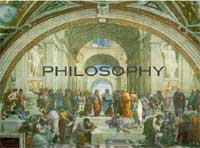|
||||||||||||||||||||||||||
| Philosophy - PHILA13400 | ||||||||||||||||||||||||||
This plan only applies to students who commenced their degree program before 2009.
This plan is for a major sequence in Philosophy. Studying Philosophy provides intellectual skills which can help you to think critically, to better organise your thoughts and to present them logically and persuasively. Philosophy also addresses fundamental questions about the nature of reality, language, meaning, human knowledge and values. It provides a useful complement to studies in many disciplines but especially those in which logical thinking and clear expression is important. The range of Upper level courses makes it possible for students majoring in other disciplines to select courses complementing their interests. Level 1 Courses
Level 2 Courses
Level 3 Courses
The availability of Level 3 courses varies from year to year. Please refer to the courses by Subject Area link on the left hand side of this page for further information.
There are three Level 1 courses. Students can gain Upper Level status in Philosophy by completing one but it is suggested that two be completed if you wish to complete a major sequence in Philosophy.
Students must be in at least Year 2 of study in the Faculty in order to take Upper Level courses in Philosophy, courses numbered PHIL2000 and above. Each course is designed to be self-contained, but particular groupings of courses will enable students to pursue sustained treatments of particular areas or historical developments in the treatment of issues. Stream 1: Epistemology & Metaphysics: examines the categories with which we understand the world. Study in this field includes the foundations and justifications of knowledge, the nature of scientific explanation, the concept of mind, artificial intelligence, logical knowledge and proof, critical thinking and reasoning, and the principles of linguistic meaning. Stream 2. Moral, Social and Political Philosophy: examines the basis, character and justification of ethical judgement, the history of political thought, applied ethics, social theory and social justice, theories of governance and political legitimacy, the philosophy of education, the philosophy of technology, environmental philosophy and the nature and justification of religion. Stream 3. Philosophical Traditions: focuses on specific traditions, periods and figures in philosophy, which may include topics described in the two streams above. The courses that we teach in this stream include continental philosophy, Chinese philosophy, ethics, phenomenology, existentialism, hermenuetics, classical Greek philosophy, modern philsophers such as Kant, Hegel and Nietzsche. In certain circumstances the prerequisites specified for courses may be waived. Students who feel they have a case for a concession of this kind should consult the School. A major sequence in Philosophy is a sequence of courses carrying at least 42 units of credit including no more than 12 units of credit in Level 1 courses and at least 12 units of credit in courses numbered PHIL3000 and above.
Subject to the approval of the Discipline Coordinator, a student may be permitted to count up to 6 units of credit offered outside Philosophy toward a major sequence in Philosophy. Some Philosophy courses may be counted towards a major sequence in History and Philosophy of Science, Education and Political Science. Honours Level study is available in Philosophy. Students interested in studying at Honours Level should refer to the Honours plan record for entry requirements.
|
||||||||||||||||||||||||||



